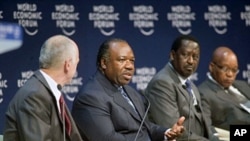The study by the African Development Bank indicates one-third of Africa’s 900 million people have more to spend on domestic goods and describes that group as middle class.
However, the bank includes in the definition of middle class some 191 million Africans it describes as a floating class, who are able to spend between $2 and $4 per day per person. African Development Bank Chief Economist and Vice President, Professor Mthuli Ncube says this group is unstable and is vulnerable to slipping back into poverty.
"There is a lower part however that we’ve defined as the lower middle class, between $2-$4 per day. That $2 to $4 per day is vulnerable to shocks," said Ncube.
The actual group of middle class from the bank's study appears to be about 123 million people who spend between $4 and $20 per day and are stable economically. Ncube says this group is the engine that is driving future economic growth in Africa.
"The middle class is a source of economic dynamism first of all, they are the source of entrepreneurship, in the sense that they are able to open businesses, run businesses, mostly successfully, so it’s a source of sustainable economic growth and development," said Ncube.
In Ghana alone, possession of cars and motorcycles has increased by 81 percent since 2006. Speaking to VOA following a media briefing running parallel to the World Economic Forum for Africa being held in Cape Town, Ncube said that while there are a number of reasons behind the growth of this particular class of Africans, education has been a big catalyst.
"In the African continent the main channel into the middle class is education. It’s almost the most critical thing. Africans have been well educated over two generations and that has allowed people to move into the middle class," said Ncube.
Ncube says the other reason is governance. "Whenever there is enough of an enabling environment for the people to be involved in entrepreneurship, to run businesses, a middle class develops because it is allowing private wealth accumulation to take place," he said.
Ncube says the middle class has also fueled a rise in Africa’s per capita income and that they account for the majority of car and homeowners on the continent. They are consumers of information technology and mobile telephone services, and many send their children to private schools, colleges and other educational institutions in South Africa, Europe and the United States.
Tunisia, Gabon and Botswana have the largest middle class, while Liberia, Mozambique and Rwanda have the smallest. Ncube says it’s important for African governments to recognize that there is a growing middle class in their countries; and if it doesn’t yet exist, governments must help, create and embrace this class, as it is a source of sustainable economic development for the future.




